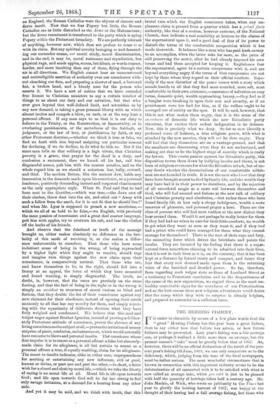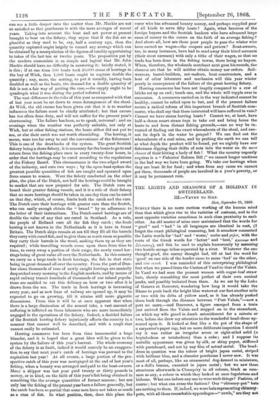THE HERRING FISHERY.
IT is easier to chronicle by means of a few plain words that the
" great " Herring Fishery has this year been a great failure, than to say either how that failure has arisen, or how future failures may be prevented. Last year's fishing was a fair average one, or perhaps it realized a little more than an average, but the present season's "take" must be greatly below that of 1867. As, however, there will be no official declaration of the result of the pre- sent year's fishing till June, 1869, we can only conjecture as to the deficiency, which, judging from the tone of the local newspapers, must be rather serious. The most wonderful circumstance that is known in connection with this important industry seems to be the determination of all connected with it to be satisfied with what is now called an average take, which pro rata is just to be pleased with half the quantity of herrings taken half a century ago. Mr. John Mackie, of Wick, who wrote so jubilantly to the Times last year to glorify the herring harvest of 1867, was happy at the thought of their having had a full average fishing, but those who can see a little deeper into the matter than Mr. Mackie are not so satisfied as that gentleman is with the mere averages of recent years. Taking into account the boat and net power at present brought to bear on the fishery, they argue that if the fish are as plentiful as they used to be, say, half a century ago, then the quantity captured ought largely to exceed any average which can be obtained by a manipulation of the figures of totality appertaining to takes of the last ten or twelve years. The proposition put by the modern economists is so simple and logical that Mr. John Mackie should have no difficulty in answering it; briefly stated, it is this ; if at one time 500 boats took 50,000 crans of herrings in the bay of 'Wick, then 1,000 boats ought to capture double the quantity ; nay, more, the netting, to put it roundly, having been doubled as well as the boats, the demand for a double quantity of fish is not a fair way of putting the case,—the supply ought to be quadruple what it was during the period referred to.
The vast difference in the take of this year as compared with that of last year must be set down to some derangement of the shoal. At Wick, the old excuse has been given out that it is to weather influences the failure must be chiefly attributed ; but that excuse has too often done duty, and will not suffice for the present year's shortcoming. The failure has been, so to speak, universal ; and on evenings when the weather was perfectly suitable, not only at Wick, but at other fishing stations, the boats either did not put to sea, or else their catch was not worth chronicling. The herring, it seems, were too far away to suit the convenience of the fishermen ! This is one of the drawbacks of the system. The great Scottish fishery being a shore fishery, it is necessary for the boats to go to and return from the fishing-place once in every twenty-four hours, in order that the herrings may be cured according to the regulations of the Fishery Board. This circumstance is the two-edged sword of the industry, and cuts two ways ; by the open-boat system the greatest possible quantities of fish are caught and operated upon from season to season. Were the fishery conducted on the other plan, the plan of the Dutch, not half the herrings could be brought to market that are now prepared for sale. The Dutch cure on board their greater fishing vessels, and it is a rule of their fishery that no more herrings should be taken in one day than can be cured on that day, which, of course, limits both the catch and the cure. The Dutch cure their herrings with greater care than the Scotch, who can easily enough obtain the " brand" by an adherence to the letter of their instructions. The Dutch-cured herrings are of double the value of any that are cured in Scotland. As a rule, the people of Holland cure all the fish they catch ; the fresh herring is not known in the Netherlands as it is here in Great Britain. The Dutch ships remain at sea till they fill all the barrels theycarry with cured fish, and to give them as much room as possible they carry their barrels in the wood, making them up as they are required ; while travelling vessels come upon them from time to time, to carry away a portion of their cargo, the newly cured her- rings being of great value all over the Netherlands. In this country we carry on a large trade in fresh herrings, the fish in that state being in great demand all over the country. From the port of Dun- bar alone thousands of tons of newly caught herrings are annually despatched every morning to the English markets, and by means of rapid railway transit hundreds of thousands of our inland popula- tions are enabled to eat this delicacy an hour or two after it is drawn from the sea. The trade in fresh herrings is increasing every year, and as new lines of railway are opened up, it may be expected to go on growing, till it attains still more gigantic dimensions. From this it will be at once apparent that when there is a large diminution of the annual take, a vast amount of suffering is inflicted on those labourers who are more immediately engaged in the operations of the fishery. Indeed, a decided failure of the Scottish herring fishery injuriously affects the country in, a manner that cannot well be described, and with a resilt that cannot easily be estimated.
Herring commerce has been from time immemorial a huge blunder, and it is hoped that a great blow will be given to the system by the failure of this year's harvest. The whole economy of the fishery is at fault, indeed it would scarcely be an exaggera- tion to say that next year's catch of herrings was pawned to the capitalists last year ! At all events, a large portion of the pro- spective catch of this year was mortgaged at the end of last year's fishing, when a bounty was arranged and paid to the boat-owners. Many a skipper was last year paid twenty or thirty pounds in money, or in kind, on the faith of this year's fish being obtained in something like the average quantities of former seasons ; but not only has the fishing of the present year been a failure generally, but the catch has been so partial that some men have not taken as much as a cran of fish. In what position, then, does this place the
curer who has advanced bounty money, and perhaps supplied gear of all kinds to serve fifty boats ? Again, what becomes of the foreign buyers and the Scottish bankers who have advanced large sums of money to the curers on the faith of an average fishing? And above all, how are those poor people to pass the winter who have earned no wages—the coopers and gutters ? Boat-owners, too, in many instances, have had to send away their hired servants (their stout oarsmen) with only a tithe of their wages, so that no trade has been done in the fishing towns, there being no buyers. When, therefore, the wholesale merchant next goes his rounds, the chances are that he will neither obtain money nor orders. Sail- weavers, barrel-builders, net-makers, boat-constructors, and a host of other labourers and mechanics will this year winter poorly in consequence of the failure of the great herring fishery.
Herring commerce has been not inaptly compared to a row of bricks set up on end ; touch one, and the whole will topple over in succession. A commerce carried on in the way indicated cannot be healthy, cannot be relied upon to last, and if the present failure secure a radical reform of this important branch of Scottish com- merce, who shall say that those interested will have suffered in vain? Cannot we have steam herring boats ? Cannot we, at least, have half-a-dozen smart steam tugs to take out and bring home the boats to and from distant fishing grounds,—can no way be in- vented of finding out the exact whereabouts of the shoal, and can- not its depth in the water be gauged ? We can find out the whereabouts of a coal mine, and by probing the earth we can tell at what depth the product will be found, yet we nightly have our fishermen dipping their drifts of nets into the water on the mere chance of their hitting a body of fish ! What the country urgently requires is a "Fisheries' Reform Bill ;" we cannot longer continue in the bad way we have been going. We take our herrings when they are least fit for food ; and when from any cause we cannot get them, thousands of people are involved in a year's poverty, or it may be permanent ruin.































 Previous page
Previous page